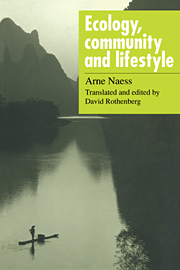Book contents
- Frontmatter
- Contents
- Translator's preface
- Introduction: Ecosophy T – from intuition to system
- 1 The environmental crisis and the deep ecological movement
- 2 From ecology to ecosophy
- 3 Fact and value; basic norms
- 4 Ecosophy, technology, and lifestyle
- 5 Economics within ecosophy
- 6 Ecopolitics within ecosophy
- 7 Ecosophy T: unity and diversity of life
- Bibliography
- Index
3 - Fact and value; basic norms
Published online by Cambridge University Press: 13 October 2009
- Frontmatter
- Contents
- Translator's preface
- Introduction: Ecosophy T – from intuition to system
- 1 The environmental crisis and the deep ecological movement
- 2 From ecology to ecosophy
- 3 Fact and value; basic norms
- 4 Ecosophy, technology, and lifestyle
- 5 Economics within ecosophy
- 6 Ecopolitics within ecosophy
- 7 Ecosophy T: unity and diversity of life
- Bibliography
- Index
Summary
Announce your value-priorities forcefully
A deep ecological movement envisages a shift in basic attitudes from the dominant paradigm in leading industrial societies. Norms and values again and again have to be contrasted, not with any explicit philosophy which justifies the dominant paradigm (that does not seem to exist) but with its practice.
Therefore, we need an elaboration of our norms and values which correspond to the shift of basic attitudes. This requires the tentative systematisation of those norms and values. This is the theoretical background which sets the stage for this chapter, where philosophically problematic topics will be discussed, bearing in mind their importance to practical ecological debate. I will discuss exactly the same subjects in different ways, because readers with diverse backgrounds have been found to require different approaches to the same topics.
Not everything can be proven – an old thought first emphasised by Aristotle. The string of proofs on any definite occasion must commence somewhere. The first unproven links in such chains of argument are called ‘axioms’ or ‘postulates’. Those which are proven by means of these postulates are called ‘theorems’. History of mathematics and logic shows a diversity of systems, but they all have starting points beyond which they do not penetrate. They also have rules, some deduced from other rules, but at least one must be simply postulated, without any justification whatsoever.
When value priorities are traced back to the very fundamentals, the validity of the latter can then be questioned.
- Type
- Chapter
- Information
- Ecology, Community and LifestyleOutline of an Ecosophy, pp. 68 - 86Publisher: Cambridge University PressPrint publication year: 1989



